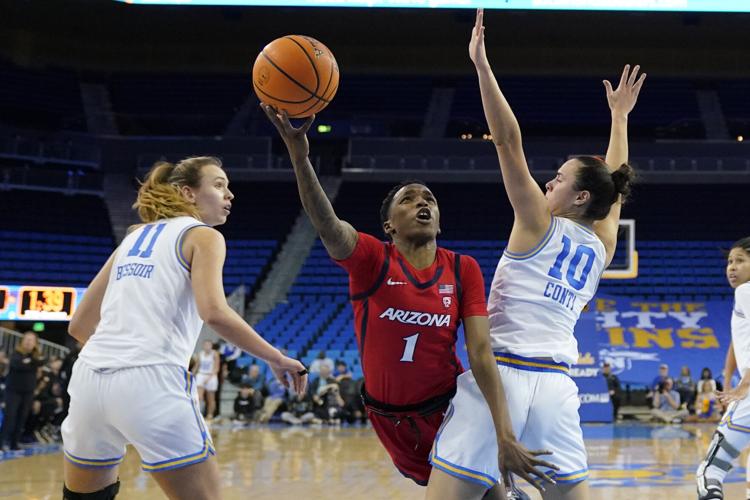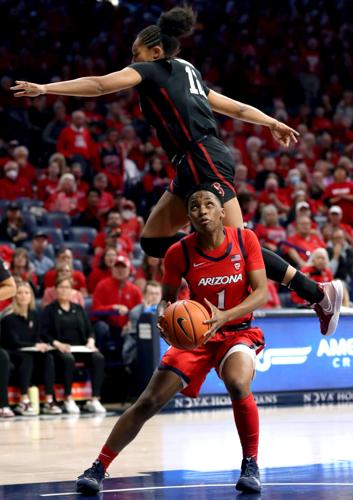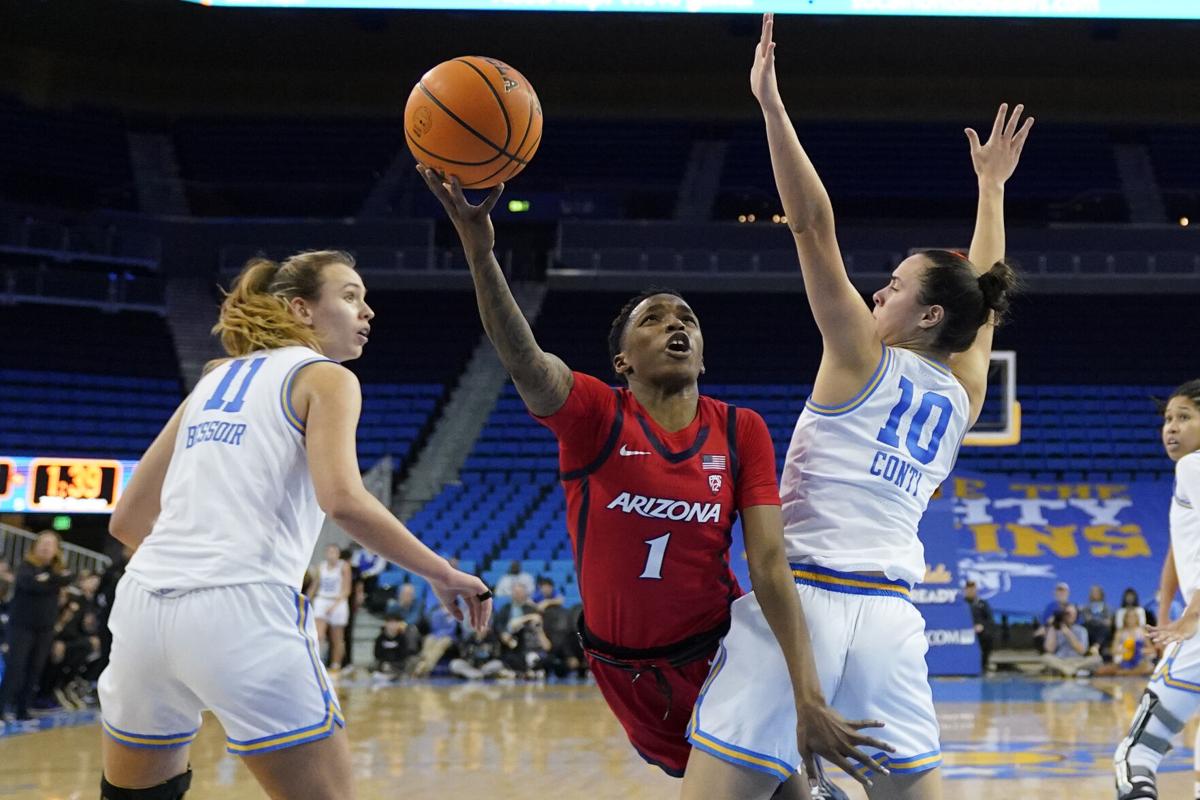Shaina Pellington has grown in big and small ways during her three seasons on the court as a Wildcat.
It’s not just about the numbers — although her assists and points have gone up significantly.
She is averaging 3.7 assists per game, up from 2.4 a year ago. She has dished 81 total assists, her UA career high. Last year she finished with 64.
As a scorer, her average has risen from 5.8 to 12.1 points per game from Year 1 to Year 3.
This season she is playing within herself and not taking on all the pressure to make the Wildcats run.
Her growth hasn’t come completely without bumps. It wouldn’t be real without some downs.
Pellington fouled out in consecutive games for the first time in her career against Utah and Colorado. She also had rough outings against Washington State and in Thursday’s loss to Stanford.
Yet the Wildcats know they can rely on Pellington. She’s always there to direct them on the court with her experience and come up with gems like her 21-point performance against then-No. 14 UCLA and her 17 points — and four steals — against USC. Those performances earned her Basketball Canada’s Player of the Week honors.
Ahead of No. 17 Arizona’s game against Cal on Sunday at McKale Center, the Star sat down with Pellington for a wide-ranging conversation. Topics included her biggest area of growth this season, the moment she knew the Wildcats would beat the Bruins and those physical Pac-12 games.
You’ve grown a lot this season. What do you think is the biggest area of improvement?
A: “Not being my own worst enemy. I think a lot of the times when I get down on myself, when I’m not doing well, I can shoot myself in the foot. For me, it’s just being conscious of like, ‘Why am I down on myself?’ And when I’m down on myself correcting that so that it doesn’t affect me for the entirety of the game.
“I think in that area I have grown a lot just recognizing that, believing in myself. Trusting the process and the work that I’ve put in to get to this point. Going back to my natural abilities, knowing what I’m good at and knowing when to use those strengths and when not to.”
In your interview with Pac-12 Networks after the UCLA win, you said when the game went into overtime, your thoughts were ‘We got this.’ What was it about that moment that made you feel that way?
A: “I don’t know. Sometimes you just get a feeling. I get a feeling when I know we’re locked in. I can tell when I look in everybody’s eyes. For me in that moment, after looking at everybody individually, I was like, ‘Oh yeah, we got this.’ I could just tell everybody was just so dialed in. And I could tell that everybody was going to do whatever (we) needed to win that game.
“I knew that I made a decision within myself that I was going to do whatever was possible to win that game. I think everybody did. And everybody stepped up huge. People stepped up throughout different points in the game, and it really helped us in the end. We never gave up.”
You played 87 of 95 minutes in the overtime games at UCLA and USC. That’s a lot. Did you come home and just sleep?
A: “We got back and yes, I just went home and ate and slept. I’m still sore right now just sitting here (on Tuesday). I had a pretty nasty fall in the game and bruised my tailbone, so it’s even hard to just sit down right now. But it comes with the game. Luckily, we have a good staff here that can help us treat our bodies, get us ready and prepared for games.”

Arizona guard Shaina Pellington fakes out Stanford guard Indya Nivar to score on a fastbreak in the early going at McKale Center on Feb. 9, 2023.
There was another time it looked like you fell on your ribs. What happened?
A: “Oh my gosh, I don’t know what I did. But whatever happened I landed like, almost on my side. It felt like my ribcage … like my rib almost got caught and I hit the floor. It was so weird. I don’t know how to describe it. Basically, when I got up, my entire left side of my body was just tingling, almost like numb. I took a knee. I was like, ‘There’s something wrong.’
“I came off and got treatment from (UA associate athletic trainer) Bart (Jameson). I tried to get back in there as quickly as possible because we needed to win that game.”
You’ve battled through a lot this year. You started out the Pac-12 season with the flu and played through it. What makes you gut things out?
A: “You get the job done by any means necessary. I always say that to myself. When my parents say that to me — ‘By any means necessary, get the job done’ — whatever you got to do, do it. Suck it up. Do what you got to do, unless it’s broken … you got to find a way.”
We’ve noticed more acrobatic moves at the hoop from you this season. Do you practice those moves to find those angles to finish?
A: “In practice, we do a lot of things where we focus on finishing with contact. That’s something that really helps me, being able to embrace contact and finish at the rim. Because I’m a smaller player (5-8) and it’s hard to get to the rim as a smaller player, you have to beat your defender. You have to beat everybody around that’s helping, and then you’ve got to finish at the rim against somebody who’s two feet taller than you.
“It’s something that I’ve practiced and worked on, but in games you just have to read a defender and you do what’s best, whatever your body allows you to be able to do. Luckily, I’ve been blessed with athleticism, from genetics. I’m able to do a lot of things with my body and alter my body a lot of different ways. … To get to the rim and finish at the rim when I want to, it’s a pretty cool tool that I have in my backpack.”
<&rule>
Arizona women's basketball guard/forward Jade Loville answers questions from local media on Feb. 8, 2023 during a scheduled media session. Loville spoke about the upcoming Feb. 9 matchup with Stanford and the recent "battle" against USC in double overtime after an OT win over UCLA. Video by Aidan Wohl/Special to the Arizona Daily Star






